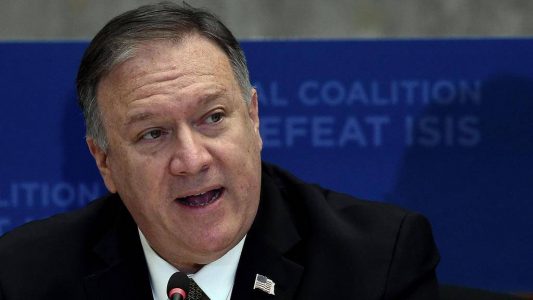
US and European allies disagree over prosecution of Islamic State terrorists
The United States and its European allies in the global coalition against ISIS failed to agree on how to deal with fighters of the extremist group jailed in Syria, with the US dismissing France’s proposal to try them in Iraq as “irresponsible”.
Representatives of more than 30 coalition members met in Washington on Thursday at the request of France following Turkey’s incursion in to north-east Syria that has weakened US-backed Syrian forces holding thousands of foreign ISIS fighters.
The US wants the militants to be returned to their home countries to face trial or be rehabilitated, while European states oppose the idea, saying the fighters should be tried close where they the committed their crimes.
“Coalition members must take back the thousands of foreign terrorist fighters in custody and impose accountability for the atrocities they have perpetrated,” US Secretary of State Mike Pompeo told the meeting.
But Nathan Sales, the State Department’s counterterrorism co-ordinator, acknowledged that “there is, candidly, a difference of opinion about the best way to resolve this problem”.
“The United States thinks that it’s inappropriate to ask Iraq in particular to shoulder the additional burden of foreign fighters, particularly from Europe,” Mr Sales told reporters after the meeting.
“It would be irresponsible for any country to expect Iraq to solve that problem for them,” he said.
“We think there should be a sense of urgency to repatriate now while we still can.”
European countries such as France and Britain have no desire to see the return of battle-hardened ISIS followers, fearing fresh attacks at home as well as a public backlash. They also argue that it would be more difficult to collect evidence against them if they were tried in Europe. French Foriegn Minister Jean-Yves Le Drian visited Iraq last month to open talks about trying European ISIS fighters there.
Mr Le Drian said his government was seeking the “certain and lasting detention” of fighters, and pointed out that the majority of prisoners were from Iraq and Syria.
“For our part, we will continue to say that they should be tried as close as possible to the crimes they committed,” he told reporters after the meeting.
“Let’s never forget that these women and men who joined Daesh made a fully conscious choice to fight for a terrorist organisation,” he said.
European governments have revoked the citizenship of a number of citizens over ISIS links.
Such a step is virtually impossible in the United States, although a court on Thursday backed the State Department’s finding that one US-born recruit, Hoda Muthana, did not have US citizenship as her father was a diplomat from Yemen at the time of her birth.
The US President Donald Trump was widely criticised for his decision to pull back US troops in north-east Syria, effectively clearing the way for Turkey to attack the Kurdish-dominated forces that helped defeat ISIS in the country and undermining their control over the area.
But Mr Pompeo said US forces remained positioned to “make sure ISIS will never get a second wind”.
“The United States will continue to lead the coalition and the world on this essential security effort,” he told the meeting.
He scoffed at criticism of Mr Trump’s move, pointing to the October 26 raid by US forces that killed the group’s chief Abu Bakr Al Baghdadi as well as an operation that killed his would-be successor.
“Ask them if there’s a deficit of American leadership in fighting ISIS,” Mr Pompeo said.
The coalition meeting came a day after Mr Trump welcomed Turkish President Recep Tayyip Erdogan to the White House, just weeks after he had threatened to destroy the Nato ally’s economy over its Syria incursion.
Nato Secretary General Jens Stoltenberg acknowledged that there were “differences” among alliance members on Syria, where the situation he said “remains fragile and difficult.”
But Mr Le Drian said France felt reassured by a joint statement from the meeting reaffirming the anti-ISIS coalition’s objectives, saying that all members agreed “to avoid unilateral steps without consulting with others”.
The ministers agreed to hold a meeting next year focused on ISIS affiliates in West Africa, where the extremists have staged increasingly destructive attacks.
Source: The National





